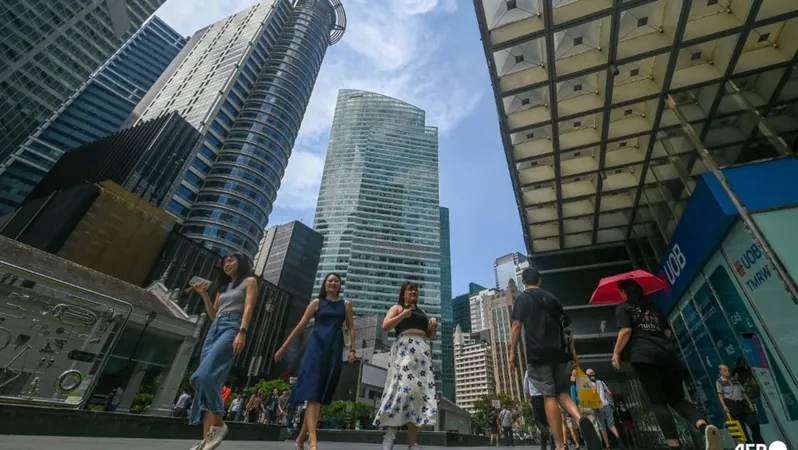
Singapore's Core Inflation Makes a Surprising Comeback at 2.7%: What You Need to Know!
2024-09-23
SINGAPORE: In a surprising turn of events, Singapore's core inflation has rebounded to 2.7% year-on-year in August, marking its first increase in six months. This comes after the last rise recorded in February, and it has caught many economists off guard.
According to the Monetary Authority of Singapore (MAS) and the Ministry of Trade and Industry (MTI), the primary driver behind this surge was an uptick in services inflation, which climbed to 3.3% from 2.9% in July. This increase reflects a notable rise in holiday expenses and a minor reduction in airfares. Interestingly, a Reuters poll had previously predicted a more modest 2.6% inflation rate for August, highlighting how unexpected this uptick has been.
Overall, headline inflation for August softened to 2.2%, primarily due to decreasing private transport costs that outpaced core inflation increases. It’s important to note that core inflation metrics exclude accommodation and private transportation costs, giving a clearer view of inflation in essential services.
Digging Deeper: What's Behind the Numbers?
On a month-on-month basis, core inflation saw an uptick of 0.3%, while overall inflation increased by 0.7%. Retail goods and household durables also experienced a slight increase, inching up to 0.4%.
Housing costs seemed to slightly ease, with accommodation inflation reducing to 2.9% due to slowing rent growth. Conversely, private transport saw a significant decline, dropping to -1% due to more significant reductions in car prices, despite a slower rise in petrol costs.
Electricity and gas costs remained stable at 6.6%, and food inflation held steady at 2.7%, majorly influenced by varied trends in non-cooked food and food services costs.
What Lies Ahead? The Inflation Outlook for Singapore
Looking forward, MAS and MTI predict that Singapore's core inflation may continue on a “gradual moderating trend” throughout the remaining quarter and into Q4 of this year. They noted that global energy prices have been declining, and the costs of imported goods are also tapering off, which should aid in the easing of inflation.
Interestingly, even as services inflation exhibits some volatility—especially with international travel in play—it appears to be on a downward trajectory for the remainder of 2024. The strengthening of the Singapore dollar is also expected to help contains inflation by tempering import costs.
Despite these optimistic projections, it is essential to note that several risks remain. A robust labor market could potentially lead to an upsurge in wage growth, putting additional pressure on prices. Moreover, fresh geopolitical tensions, adverse weather impacts, and renewed disruptions in global shipping could cause food and energy prices to rise unexpectedly.
For the entire year, core inflation is currently forecasted to average between 2.5% and 3.5%, while the overall inflation rate should lie within the range of 2% to 3%. Notably, if we exclude the inflationary effects of the recent Goods and Services Tax (GST) increase to 9%, both core and overall inflation could settle around 1.5% to 2.5%.
As citizens and businesses brace for the coming months, the most pressing question remains: How will this economic environment impact daily life, spending habits, and overall economic growth in Singapore? Keep your eyes on the developments, as the inflation saga is far from over!


 Brasil (PT)
Brasil (PT)
 Canada (EN)
Canada (EN)
 Chile (ES)
Chile (ES)
 España (ES)
España (ES)
 France (FR)
France (FR)
 Hong Kong (EN)
Hong Kong (EN)
 Italia (IT)
Italia (IT)
 日本 (JA)
日本 (JA)
 Magyarország (HU)
Magyarország (HU)
 Norge (NO)
Norge (NO)
 Polska (PL)
Polska (PL)
 Schweiz (DE)
Schweiz (DE)
 Singapore (EN)
Singapore (EN)
 Sverige (SV)
Sverige (SV)
 Suomi (FI)
Suomi (FI)
 Türkiye (TR)
Türkiye (TR)